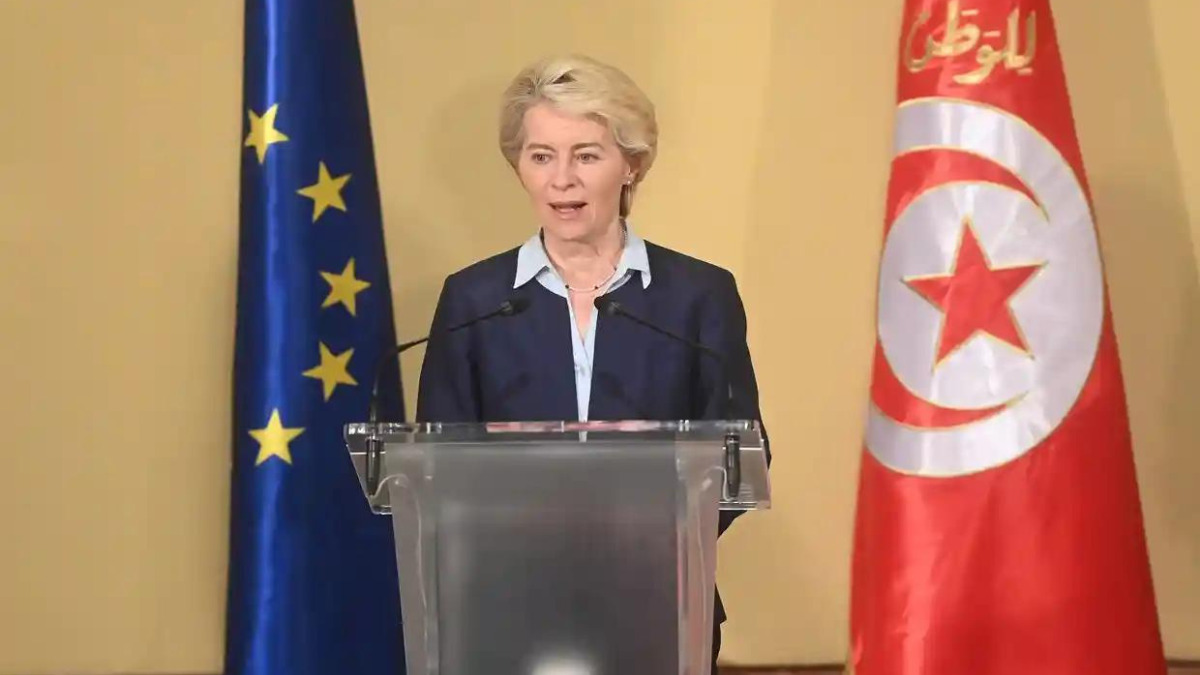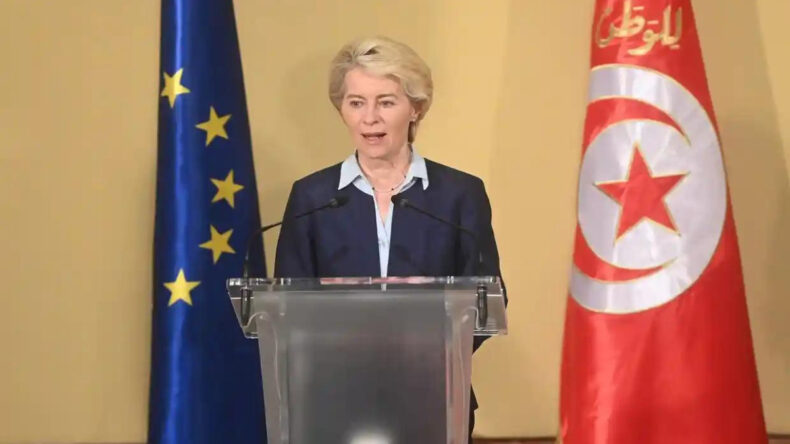The European Union (EU) and Tunisia have reached a €1bn (£860m) agreement aimed at addressing irregular migration, with the Tunisian president condemning those who sympathize with migrants but fail to respect their pursuit of equality in life.

Ursula von der Leyen, the President of the European Commission, praised the deal with Tunisia, which includes substantial measures to combat dangerous irregular migration across the Mediterranean, as an investment in mutual prosperity and stability.
This migration partnership with Tunisia follows shortly after President Kais Saied disclosed the “shocking” extent of human trafficking in the country. Tunisian officials revealed that in the first half of 2024, remittances from sub-Saharan Africa alone amounted to approximately £760m, highlighting the significant economic impact of this issue.
During the unveiling of the agreement in Tunisia on Sunday evening, President Saied, accompanied by Von der Leyen, the Prime Ministers of Italy and the Netherlands, criticized humanitarian organizations for disseminating misinformation about Tunisia instead of focusing on dismantling the criminal networks responsible for the deadly human trafficking trade.
Saied emphasized that people worldwide share a common desire for coexistence, equitable futures, and respect instead of mere sympathy.
In recent months, thousands of undocumented individuals have flocked to the coastal city of Sfax with the intention of embarking on Europe-bound boats operated by human traffickers. This has led to an unprecedented migration crisis for Tunisia.
According to Agence France-Presse, Libyan border guards have rescued numerous individuals who were allegedly abandoned in the desert by Tunisian authorities, without access to water, food, or shelter.
Following racial unrest in early July in Sfax, Tunisia’s second-largest city, hundreds of people from sub-Saharan African nations were forcibly relocated to the desert and inhospitable areas along the borders of Libya and Algeria.
The migrants, visibly fatigued and suffering from dehydration, were seen sitting or lying on the sandy ground, utilizing shrubs to seek shelter from the scorching summer temperatures that exceeded 40°C (104°F).
Irregular Migration
A group of at least 80 individuals was discovered in an uninhabited area near Assah, a town located approximately 93 miles (150km) west of Tripoli, close to the Tunisia-Libya border.
Dutch Prime Minister Mark Rutte, who is stepping down from his position, stated that the agreement aims to prevent people from undertaking perilous and often fatal sea journeys to Italy, while also disrupting the business operations of smugglers.
The three EU leaders traveled to Tunisia on Sunday to sign a memorandum of understanding for a €1bn package that was agreed upon in June. However, concerns over Tunisia’s human rights record continue to spark controversy.
The details of the agreement included a commitment to resume discussions on an association agreement between the EU and Tunisia, as well as providing Tunisian students with access to the Erasmus exchange program.
According to Rutte, a significant portion of the €1bn package is dedicated to strengthening efforts against the criminal organizations involved in trafficking and smuggling of people.
Giorgia Meloni, the leader of Italy’s far-right party, praised the deal with Tunisia as a model for developing new relations with North African countries, expressing a mixture of pride and gratitude.
During a meeting on Friday, an official from the Tunisia National Security Council revealed that undocumented individuals from sub-Saharan Africa received 3 billion dinars (approximately £750m) in remittances from their home countries in the first half of 2024. This amount surpasses the revenue generated by Tunisia’s vital tourism industry, which amounted to 2.2 billion dinars during the same period.
President Saied, speaking at the National Security Council meeting in Carthage Palace, described the figure as shocking and interpreted it as an indication that Tunisia is being specifically targeted.













